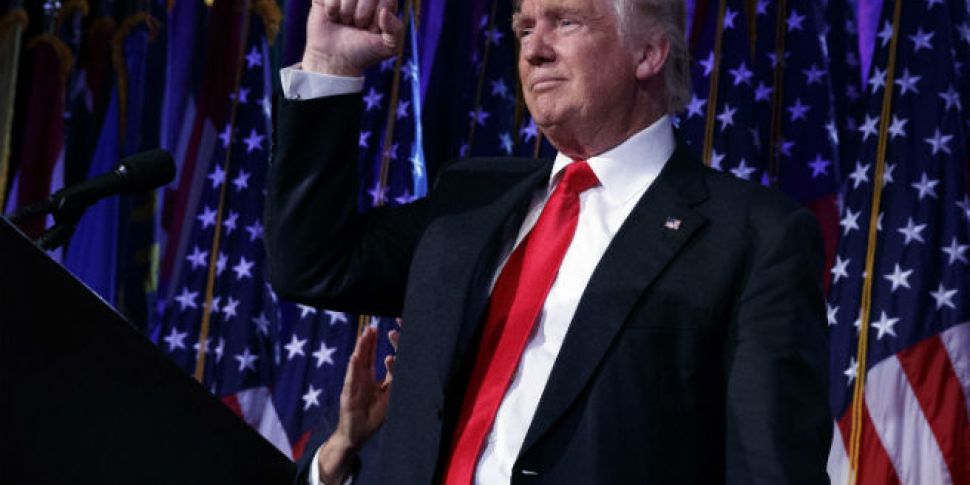President-elect Donald Trump was vocal about women throughout his campaign - specifically on the topic of reproductive rights.
His stance, however, has never been clear. In 1989, Trump co-sponsored a dinner at the Plaza Hotel in Manhattan (which he then owned) honouring Robin Chandler Duke, a former president of NARAL, an organisation that engages in efforts to oppose restrictions on abortion and expand access to abortion. He chose not to attend, the New York Times reported, after his family was threatened by anti-abortion activists.
A decade later, Trump appeared on NBC. During an interview with Tim Russert, Trump defends his broadly liberal positions by explaining that he "grew up in Manhattan, not Iowa".
He followed this up in his 2000 book The America We Deserve, writing that he was pro-choice, but struggled with the idea of the procedure itself.
"I support a woman’s right to choose, but I am uncomfortable with the procedures," he wrote. "When Tim Russert asked me on Meet the Press if I would ban partial-birth abortion, my pro-choice instincts led me to say no. After the show, I consulted two doctors I respect and, upon learning more about this procedure, I have concluded that I would support a ban."
Between 1999 and present day, Trump views shifted seismically. In a 2011 interview, he explained the reason for his switch. He further referred to it during the first election debate of 2015.
"What happened is friends of mine years ago were going to have a child, and it was going to be aborted. And it wasn’t aborted. And that child today is a total superstar, a great, great child. And I saw that. And I saw other instances," he said.
In an interview with MSNBC in March, Trump asserted that women who receive abortions once the procedure is illegal will face punishment. The men are involved will not, he added. His campaign later issued a statement saying the abortion issue should be left to individual US states to determine.
NEW Trump to @msnbc: "there has to be some form of punishment" for women who have abortions but he has yet to determine what that should be.
— Ali Vitali (@alivitali) March 30, 2016
Trump went on to change his mind again during an interview with CBS.
“The laws are set now on abortion and that’s the way they're going to remain until they’re changed,” he said, according to CBS’s transcript. “I would’ve preferred states’ rights. I think it would’ve been better if it were up to the states. But right now, the laws are set.... At this moment, the laws are set. And I think we have to leave it that way.”
Roe v Wade
US abortion rights were enshrined in the Supreme Court's landmark 1973 ruling in Roe v Wade, in which a woman took the state of Texas to court for not allowing her to have an abortion. She reasoned that the Ninth Amendment, which states that the enumeration of certain rights in the Constitution “shall not be construed to deny or disparage others retained by the people,” protected the right to have an abortion as a right retained by the people and beyond the reach of government. Though they ruled in her favour, Texas' laws on abortion were not challenged beyond that case.
By the time Roe v. Wade made its way to the Supreme Court, abortion was illegal in all cases in 30 states, legal in certain circumstances (rape, incest, danger to health) in 16 states, and only totally legal in four (Alaska, Hawaii, New York, and Washington).
On the 40th anniversary of the ruling, 63% of Americans stated that they do not want to see Roe v. Wade overturned. During his campaign, Trump expressed a desire to not only overturn the ruling, but appoint pro-life judges to the Supreme Court.
Pence and Planned Parenthood
Comedian John Oliver spoke earlier in the year on how despite being theoretically legal, access to abortion was being limited through the closure of abortion clinics.
Trump's Vice President Elect Mike Pence pushed an amendment through the House to defund Planned Parenthood in 2011. Indiana was successful in its efforts, but a federal judge blocked the law from going into effect. When Pence became governor in 2013, Indiana continued to slash resources for the women's health provider. By 2014, state funding for Planned Parenthood had been cut nearly in half from 2005 levels.
The organisation was forced to close five of its smaller clinics, none of which had ever provided abortions, but they did provide STD testing. Soon, Scott County, Indiana, home to one of the closed clinics, became centre of an enormous HIV outbreak.
The global effect
Independent TD Clare Daly is calling for the Eight Amendment in Ireland to be repealed. Currently, the Eight Amendment gives "the right to life of the unborn and, with due regard to the equal right to life of the mother", outlawing abortion.
"All things considered, it's certainly a negative for women's reproductive rights," she said, speaking at an event in Dublin City University. "A Republican majority in both houses is worrying. It's a battle in America, no matter what state you're in.
"On the other side, it is a bit of a counter-revolution that he's there now. It's going to jolt some people out of there complacency and show that these issues are not resolved. It might spur things on in the way it did with the Polish situation and evoke an almighty response."
Niamh Uí Bhriai from The Life Institute said on the election: "I think the result highlighted three things in particular that are relevant to the debate on abortion here. Firstly, Hillary Clinton’s stance on abortion is actually pretty extreme, in that, like most abortion activists here in Ireland, she supports abortion on demand until birth, and that became part of the TV debate towards the end of campaign. Most people don’t support that view, and Google showed abortion as the top search related to Clinton on voting day, so that might have had an impact.
"The second thing is that it seems increasingly clear that polls may not be an effective way to really parse and understand people’s attitudes, especially on complex issues - and we can see that in relation to abortion, where responses to polls seem to change according to who is asking the question and when.
"Thirdly, it’s obvious that the mainstream media is losing its ability to influence public opinion, and that will have a significant impact on the abortion debate here, since abortion campaigners have always relied on the media to carry its message while we’ve built up thousands of volunteers to carry the pro-life message to the nation.
She added that "millions of dollars" come from donors to fund abortion campaigners in Ireland, and is unsure if Trump's election will mean some of those funds are diverted to causes in the US.
Trump has yet to comment on his future plans for Roe v Wade.









